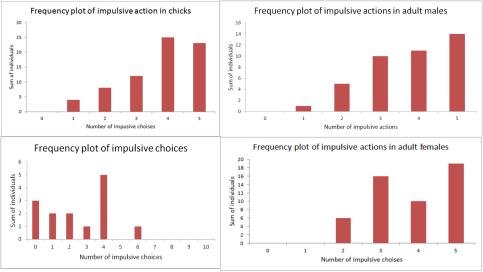Results and Discussion

Results and Discussion
Individual variation in impulsivity was found both in the cylinder and in the modified marshmallow test (figure a,b). The impulsive action and impulsive choice score did not correlate with one another (r = 0.01, P = 0.98, n = 14) suggesting that the two tests measure different traits.
Impulsive action did not correlate to any of the measured personality traits or cognitive abilities measured in this thesis. One possible explanation to this finding could be that impulsive action is more dependent on nurture than on nature. That how much impulsive action an individual shows is more dependent on what they have experienced in their surroundings or their internal hormonal levels than on their genes. This is supported in my data because there was no sex difference in impulsive action within chicks but in adults there was a significant sex difference in impulsive action suggesting that hormonal levels are influencing the impulsive action score.
In impulsive choice I found a moderate negative correlation to behavioural flexibility (r = -0.57, P = 0.035, n = 14). More behaviourally flexible birds (shorter reversal latency) also made more impulsive choices. However this negative correlation is the opposite of how theoretical and previous work suggests that behavioural flexibility and impulsive choice should correlate.
A proactive individual should be less behaviourally flexible and make more impulsive choices, compared to a reactive individual. The reason for this finding could either be that the coping styles are not as pronounced in Red Junglefowl as they are in rodents Another reason for this finding could be that while naming reversal latency as behavioural flexibility, the time it takes an individual to first explore a previously unrewarded cue might be more related to exploration speed than reversal latency. If reversal latency is interpreted as exploration speed my findings are in alignment with the proactive, reactive coping styles that an individual who is faster at exploring also makes more impulsive choices.
Responsible for this page:
Director of undergraduate studies Biology
Last updated:
